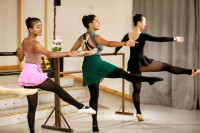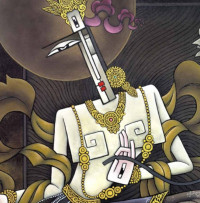Culture & Lifestyle
Reading is a vessel for ideas
Filmmaker Nani Sahra Walker believes books can be just as transformative as films, sometimes even more so, in catalysing social change and shaping collective consciousness.
Sanskriti Pokharel
Nani Sahra Walker is a filmmaker, curator and educator. She is the executive producer of short documentaries ‘Kylie’ (2023), ‘Merman’ (2023), and ‘The Last Repair Shop’ (2023), which won the 2024 Academy Award. Her debut feature film ‘Shakti’ was supported by the ARRI International Support Program, Busan APM, Cine Qua Non Lab and Film Independent.
Likewise, her feature-length documentary ‘Other Nature’ (2012) is about the fight for LGBTQ and third-gender rights in Nepal. She followed activists Bhumika Shrestha and Badri Pun after the Supreme Court ruling that granted third-gender citizenship. The film screened at BFI Flare, Outfest, Frameline, and numerous festivals worldwide.
Walker also mentors the US State Department’s American Film Showcase and Film Independent’s Global Media Makers programme. She teaches documentary, video production, multimedia, and immersive reality to undergraduate and graduate students at UC Berkeley. She is an alumna of the UC Berkeley Graduate School of Journalism and Boston University, where she focused on new media, documentary, and philosophy, respectively.
In this conversation with the Post’s Sanskriti Pokharel, Walker discusses the power of books to catalyse social change and shape collective consciousness.
What kind of books do you enjoy reading?
I love reading. As a kid, I loved epic fantasy worlds like ‘The Hobbit’. Now, I enjoy a diverse range of genres, including poetry, fiction, nonfiction, philosophy, and spiritual books. Poetry is a pure feeling, while fiction allows me to escape into different worlds. Nonfiction helps me make sense of things around me.
With a background in philosophy, I’m naturally drawn to questions about existence and our place in the universe. For me, reading is a powerful way to explore ideas, understand myself, and feel a sense of connection.
Is there any book you would want to adapt into a film?
While I focus on writing original screenplays and poetry, I have a few ideas for adaptations. I admire films that bring books to life. ‘The English Patient’ is one of my favourites.
How do you use literature to spark ideas for your films?
For me, reading is an intimate and solitary act. It allows me to reflect and be an open vessel for ideas, stories, and poetic transmissions. Literature often sparks ideas by helping me explore life experiences and events. I am drawn to documenting and understanding social movements and to asking deeper questions: How do we, as individuals and as a collective, shift our conditioning? What does the process of ‘becoming’ look like?
Literature allows me to explore these themes and express them through film.
Is there a character or story you read growing up that made you feel seen or empowered as a woman, as an artist, or as a member of a diasporic community?
There have been so many. Arundhati Roy’s work, from ‘The God of Small Things’ to her political essays, made me feel seen. She possesses a bold and empowered voice—completely unapologetic and unorthodox. She gets to the heart of things. Through her writing, I find both resonance and inspiration.
How has your journalistic training at UC Berkeley influenced your approach to documentary storytelling?
I was creating films before joining the programme at UC Berkeley, but being there introduced me to a vibrant community of filmmakers, journalists, and artists. Berkeley, with its radical history, offered a space where expression, experimentation, and boundary-pushing were encouraged. Being part of that environment helped me grow organically alongside a like-minded creative community.
You recently made a fiction film, ‘Shakti’. How did you transition from documentary to fiction?
I have worked in fiction and non-fiction films throughout my career.
In making ‘Shakti’, I blended documentary realism with fictional storytelling to dive deeper into my characters’ emotional and psychological landscapes.
At the cusp of 2020, I read about the rampant sexual violence towards Dalit women and girls in my native Nepal. When I realised that the statute of limitations was 35 days until 2015, it triggered a response.
The film is about shattered innocence and self-discovery at the intersection of traditional and modern life in Nepal. The film is centered around a mother and daughter seeking redemption in the aftermath of sexual abuse, a broken justice system, and the radical power of resilience.
I wanted to protect the privacy of survivors, so fiction felt more ethical. Blending fiction with documentary elements allowed me to explore the nuances of identity, power, and transformation in a more profound way.
Do you believe books can be as transformative as films in social movements?
Absolutely. Books can be just as transformative as films, sometimes even more so, especially in the context of social movements. One powerful example is ‘Annihilation of Caste’ by BR Ambedkar. It’s not just a text, it’s a call to conscience.
His words ignited a radical movement against caste oppression in India, and they continue to resonate with urgency today. So many books and religious texts have charted the course of history.
Nani Sahra Walker’s book recommendations
The Waves
Author: Virginia Woolf
Publisher: Hogarth Press
Year: 1931
I am fascinated by Woolf’s stream-of-consciousness style. It is one of my favourite novels about the human condition.
Thus Spoke Zarathustra
Author: Friedrich Nietzsche
Publisher: Ernst Schmeitzner
Year: 1883
Reading ‘Thus Spoke Zarathustra’ changed my life. I switched my studies to religion and philosophy and shifted focused to making films.
Letters to a Young Poet
Author: Rainer Maria Rilke
Publisher: Insel Verlag
Year: 1929
This book was a solid companion during my twenties. I return to it often, sometimes for clarity, sometimes to feel understood.
My Brilliant Friend
Author: Elena Ferrante
Publisher: Europa Editions (English)
Year: 2012
Ferrante’s writing captivated me with its sense of intrigue and emotional complexity. The raw portrait of life in Naples is also fascinating.
The Essential Rumi
Author: Rumi
Publisher: Harper San Francisco
Year: 1995
Each verse of Rumi poetry is loaded with an otherworldly depth, providing a spiritual compass, layered in metaphor and mysticism.




 14.12°C Kathmandu
14.12°C Kathmandu















